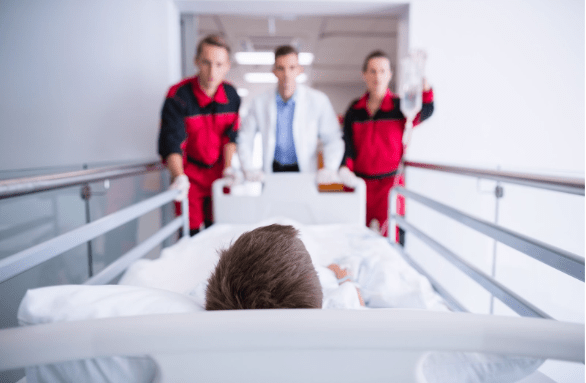Fort Wayne Medical Malpractice Lawyer
Helping people is our priority



Since 1993

When you seek medical care, you trust that healthcare providers will act in your best interests and adhere to a high standard of care. Unfortunately, medical errors and negligence can happen, leaving patients with severe injuries, long-term complications, or even life-altering consequences. If you or a loved one has suffered due to medical malpractice in Fort Wayne, the legal team at Christie Farrell Lee & Bell is here to help.
We are committed to holding negligent healthcare providers accountable and helping victims secure the compensation they need to move forward with their lives. Our experienced attorneys understand the complexities of Indiana medical malpractice law and will fight tirelessly to ensure your voice is heard.
What Is Medical Malpractice?
Medical malpractice occurs when a healthcare provider’s negligence causes harm to a patient. This could involve failing to diagnose a condition, making surgical mistakes, or providing improper treatment. To qualify as medical malpractice, it must be proven that the provider failed to meet the standard of care expected in their profession, resulting in harm to the patient.
Common examples of medical malpractice include:
- Surgical Errors: Operating on the wrong body part, leaving instruments inside a patient, or other preventable mistakes during surgery.
- Misdiagnosis or Delayed Diagnosis: Failing to correctly diagnose a condition or delaying a diagnosis, leads to worsened health outcomes.
- Medication Errors: Prescribing incorrect medications, dosages, or failing to check for harmful interactions.
- Birth Injuries: Errors during childbirth that lead to injuries such as cerebral palsy or harm to the mother.
- Anesthesia Mistakes: Administering anesthesia improperly, resulting in serious complications.
Speak with a personal injury lawyer today. Call: 317-488-5500
Why Choose Us for Your Fort Wayne Medical Malpractice Case?
At Christie Farrell Lee & Bell, our team of personal injury lawyers is committed to providing personalized attention and achieving exceptional results for victims of medical malpractice in Fort Wayne.
Here’s why you should choose us:
- Extensive Experience: Our attorneys have successfully handled numerous medical malpractice cases in Fort Wayne and throughout Indiana.
- Personalized Attention: We take the time to understand your unique situation and develop a tailored legal strategy for your case.
- Proven Results: We have recovered millions of dollars for victims of medical malpractice.
- No Upfront Fees: We work on a contingency basis, meaning you don’t pay unless we win your case.
Complete a Free Case Evaluation form now
Damages You May Recover in a Medical Malpractice Case
If you’ve been harmed due to medical negligence, you may be entitled to compensation for:
- Medical Expenses: Coverage for past and future medical treatments, surgeries, and rehabilitation.
- Lost Wages: Compensation for income lost during recovery or reduced earning capacity.
- Pain and Suffering: Damages for physical pain, emotional distress, and diminished quality of life.
- Disability or Disfigurement: Compensation for permanent injuries or disfigurement caused by malpractice.
- Wrongful Death: If you’ve lost a loved one due to medical negligence, we can help you seek damages for funeral costs and loss of companionship.
Click to contact us today
How to Start Your Medical Malpractice Claim in Fort Wayne
Taking the first step toward justice can feel overwhelming, but our team is here to guide you through the process. Here’s how we can help:
- Case Evaluation: We’ll review your medical records and consult with experts to determine if you have a case.
- Filing a Claim: In Indiana, medical malpractice claims must be filed with the Indiana Department of Insurance before proceeding with a lawsuit.
- Investigation: Our attorneys will gather evidence, consult with medical professionals, and build a strong case on your behalf.
- Negotiation or Trial: We will negotiate with the responsible parties to secure a fair settlement or take your case to trial if necessary.
Indiana’s Medical Malpractice Laws
In Indiana, medical malpractice cases are governed by specific laws that include:
- Statute of Limitations: You generally have two years from the date of the malpractice to file a claim.
- Cap on Damages: Indiana limits the total compensation available for medical malpractice claims. As of 2023, the cap is $1.8 million.
- Filing Requirements: Before filing a lawsuit, you must file a complaint with the Indiana Department of Insurance and obtain a review by a Medical Review Panel.
Navigating these laws can be complex, but our experienced Fort Wayne attorneys are here to ensure your case complies with all legal requirements.
Common Medical Malpractice Injuries
Medical malpractice can lead to a wide range of injuries, including:
- Brain injuries
- Paralysis
- Organ damage
- Birth injuries (e.g., cerebral palsy)
- Severe infections
- Loss of limbs
- Wrongful death
These injuries can have long-lasting consequences for victims and their families. We are here to fight for the compensation you deserve to help you rebuild your life.
Contact Our Fort Wayne Medical Malpractice Lawyers Today
If you or a loved one has been harmed by medical negligence in Fort Wayne, don’t wait to take action. Indiana’s statute of limitations means time is limited to file your claim. At Christie Farrell Lee & Bell, we are here to provide the compassionate, dedicated representation you need during this difficult time.
Contact us today for a free consultation, and let us help you pursue justice and the compensation you deserve.
Our team of attorneys at Christie Farrell Lee & Bell have the knowledge and decades of experience to help you understand your legal rights and seek the compensation you deserve. Contact us today for a free consultation.

Get a FREE Case Review
Schedule Your Free Consultation










